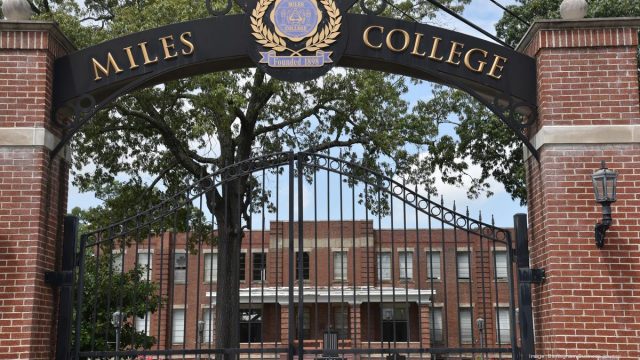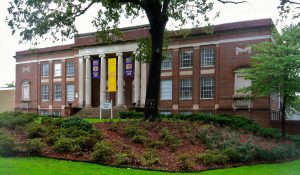
By Barnett Wright
The Birmingham Times
The wins continue to pile up for Miles College.
The Fairfield institution will be beneficiary of a partnership with multinational investment bank UBS that will focus on delivering a financial literacy and wellness curriculum, the latest in a collaboration that Miles has with a number of global brands.
UBS is partnering with the Southern Intercollegiate Athletic Conference (SIAC) to offer its Tomorrow’s Talent Program curriculum at SIAC’s 14 colleges and universities across six states.
Those include Miles and Tuskegee, Historically Black Colleges and Universities (HBCUs), in Alabama. For Miles, that partnership adds to several others announced in recent months that include ones with Goldman Sachs, Apple and IBM.
UBS will deliver financial literacy programs and workshops to SIAC students through Everfi, a social impact education technology company, to create pathways that open up financial services career opportunities and to close the income disparity gap for Blacks in America.
UBS Tomorrow’s Talent Program is a virtual accelerator program combined with personal development sessions to enhance students’ ability to communicate, engage, network, present, interview and manage their own finances.
Students will interact with a wide variety of UBS speakers in order to better understand what a career in financial services entails and to expose them to UBS’s business areas, culture, philanthropy, diversity efforts and career opportunities.

In other partnerships, earlier this month, Miles and Birmingham joined a $130M partnership that included Hope Enterprise Corp., with a $130 million commitment from Goldman Sachs, which partnered with seven cities and nine HBCUs across the South to launch the Deep South Economic Mobility Collaborative (DSEMC) to help small businesses hurt by the pandemic.
Birmingham, Montgomery and their respective HBCUs, Miles College and Alabama State University, are taking part in the collaborative, which was formed to stabilize and strengthen businesses and communities devastated by the economic crisis. DSEMC invests in the power of small businesses and entrepreneurs in the Deep South, particularly those from underserved and under-resourced communities.
DSEMC taps the expertise and capabilities of Hope Enterprise Corp., Goldman Sachs, institutions of higher learning and cities to provide access to financing, business education classes and business support services, leveraging the private, public and nonprofit sectors.
Also this month, Miles announced a partnership with #NOWINCLUDED, powered by Acclinate, for equity in COVID-19 vaccinations and clinical research trials.
Acclinate is a health care solutions provider integrating culture and technology to educate and engage diverse individuals to make informed decisions about genomic research and clinical trial participation.
“Essential to this partnership is the stark realization that the African American community has been historically omitted from significant consideration for clinical trials and research for cures to the most critical public health threats,” said Bobbie Knight, Miles College President. “Partnerships like Acclinate are vital to our institution, and we look forward to educating our students on the role they can play to mitigate the gulf between research and cure within the African American community.”
Last month, Miles and Lawson State Community College officials announced their partnerships with Propel Center, a new global campus headquartered in Atlanta that will support innovative learning and development for HBCUs.
Both schools will collaborate with Propel Center and the entire HBCU community to bring leadership and career development programming to its students. Propel Center was designed by Birmingham-based Ed Farm, a nonprofit dedicated to advancing education through technology — with Apple and Southern Company supporting the project as founding partners.
“The HBCU community is a tremendous engine of Black creativity, entrepreneurship and inclusive opportunity,” said Lisa Jackson, Apple’s Vice President of Environment, Policy and Social Justice Initiatives. “We are thrilled to join with partners and community stakeholders to support the Propel Center and be part of this groundbreaking new global hub for HBCU innovation and learning, devoted to helping faculty create best-in-class curriculum and ensuring students have access to cutting-edge skills.”
Knight said the institution looks forward to being an active contributor of the initiative. “Ed Farm’s foresight to bring together this collaboration will forever impact opportunities for our students as innovators in the future workforce,” she said. “The Center exemplifies the sincere commitment of our partners, Apple and Southern Company, to value the cultivation of the HBCU graduate.”
The Propel Center, which is the first-of-its-kind, will be a hub for more than 100 HBCUs and will connect students and faculty from across the community and provide them with the knowledge, skills, tools and resources needed to transform the nation’s talent pipeline and workforce.
And in November, Miles College announced a $2 million collaboration with IBM to help students and faculty develop technology skills. The partnership will help train students and instructors in technologies such as AI, blockchain, data science, cybersecurity, cloud and quantum.
“Miles College celebrates IBM’s leadership in recognizing the value of investing in HBCU students as current and future leaders and innovators in the technology workforce,” said Knight. “While the digital divide has historically placed many students at a technological disadvantage, this initiative will absolutely help narrow that gap.”




